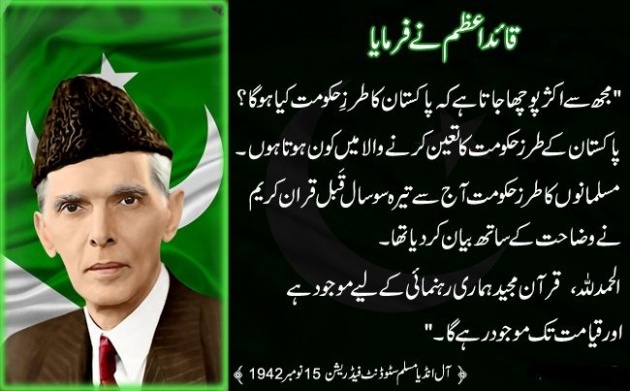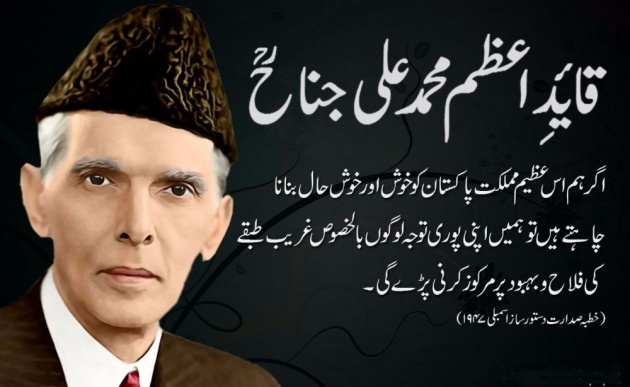 Muhammad Ali Jinnah (Urdu: محمد علی جناح ALA-LC: Muḥammad ʿAlī Jināḥ, conceived Mahomedali Jinnahbhai; 25 December 1876 – 11 September 1948) was a legal advisor, legislator, and the organizer of Pakistan. Jinnah served as pioneer of the All-India Muslim League from 1913 until Pakistan's autonomy on 14 August 1947, and after that as Pakistan's first Governor-General from freedom until his passing. He is venerated in Pakistan as Quaid-i-Azam (Urdu: قائد اعظم Great Leader) and Baba-i-Qaum (Urdu: بابائے قوم Father of the Nation). His birthday is seen as a national holiday.
Muhammad Ali Jinnah (Urdu: محمد علی جناح ALA-LC: Muḥammad ʿAlī Jināḥ, conceived Mahomedali Jinnahbhai; 25 December 1876 – 11 September 1948) was a legal advisor, legislator, and the organizer of Pakistan. Jinnah served as pioneer of the All-India Muslim League from 1913 until Pakistan's autonomy on 14 August 1947, and after that as Pakistan's first Governor-General from freedom until his passing. He is venerated in Pakistan as Quaid-i-Azam (Urdu: قائد اعظم Great Leader) and Baba-i-Qaum (Urdu: بابائے قوم Father of the Nation). His birthday is seen as a national holiday.
Conceived in Karachi and prepared as a counselor at Lincoln's Inn in London, Jinnah rose to unmistakable quality in the Indian National Congress in the initial two many years of the twentieth century. In these early years of his political vocation, Jinnah supported Hindu–Muslim solidarity, forming the 1916 Lucknow Pact between the Congress and the All-India Muslim League, in which Jinnah had likewise gotten to be unmistakable. Jinnah turned into a key pioneer in the All India Home Rule League, and proposed a fourteen-direct sacred change arrangement toward protection the political privileges of Muslims. In 1920, in any case, Jinnah surrendered from the Congress when it consented to take after a battle of satyagraha, or peaceful resistance, pushed by Mohandas Gandhi.

By 1940, Jinnah had come to trust that Indian Muslims ought to have their own particular state. In that year, the Muslim League, drove by Jinnah, passed the Lahore Resolution, requesting a different country. Amid the Second World War, the League picked up quality while pioneers of the Congress were detained, and in the races held not long after the war, it won a large portion of the seats saved for Muslims. Eventually, the Congress and the Muslim League couldn't achieve a force sharing equation for a united India, driving all gatherings to consent to partitioned freedom of an overwhelmingly Hindu India, and for a Muslim-dominant part state, to be called Pakistan.
As the main Governor-General of Pakistan, Jinnah attempted to build up the new country's legislature and approaches, and to help the a large number of Muslim vagrants who had emigrated from the new country of India to Pakistan after autonomy, expressly overseeing the foundation of displaced person camps. Jinnah kicked the bucket at age 71 in September 1948, a little more than a year after Pakistan picked up freedom from the United Kingdom. He cleared out a profound and regarded legacy in Pakistan. As indicated by his biographer, Stanley Wolpert, he remains Pakistan's most prominent pioneer.
At age 20, Jinnah started his practice in Bombay, the main Muslim counselor in the city. English had turned into his important dialect and would remain so for the duration of his life. His initial three years in the law, from 1897 to 1900, brought him few briefs. His initial move towards a brighter vocation happened when the acting Advocate General of Bombay, John Molesworth MacPherson, welcomed Jinnah to work from his chambers. In 1900, P. H. Dastoor, a Bombay administration justice, left the post briefly and Jinnah succeeded in getting the between time position. After his six-month arrangement period, Jinnah was offered a perpetual position on a 1,500 rupee for each month compensation. Jinnah obligingly declined the offer, expressing that he wanted to acquire 1,500 rupees a day—a gigantic total around then—which he in the long run did. Nevertheless, as Governor-General of Pakistan, he would decline to acknowledge an expansive compensation, settling it at 1 rupee for each month.
As a legal counselor, Jinnah picked up acclaim for his talented treatment of 1907 "Gathering Case". This discussion emerged out of Bombay city decisions, which Indians charged were fixed by an "assembly" of Europeans to keep Sir Pherozeshah Mehta out of the board. Jinnah increased extraordinary regard from driving the case for Sir Pherozeshah, himself a prominent counselor. Despite the fact that Jinnah did not win the Caucus Case, he posted an effective record, turning out to be understood for his backing and legitimate logic. In 1908, his factional adversary in the Indian National Congress, Bal Gangadhar Tilak, was captured for dissidence. Before Tilak unsuccessfully spoke to himself at trial, he drew in Jinnah trying to secure his discharge on safeguard. Jinnah did not succeed, but rather acquired an exoneration for Tilak when he was accused of dissidence again in 1916.
One of Jinnah's kindred advodates from the Bombay High Court recollected that "Jinnah's confidence in himself was mind boggling"; he reviewed that on being advised by a judge with "Mr. Jinnah, recall that you are not tending to a second rate class justice" Jinnah shot back "My Lord, permit me to caution you that you are not tending to a second rate class pleader." Another of his kindred lawyers depicted him saying:
He was what God made him, an extraordinary pleader. He had an intuition: he could see around corners. That is the place his gifts lay ... he was a reasonable scholar ... In any case, he effectively expressed his idea—focuses picked with perfect determination—moderate conveyance, word by word.



